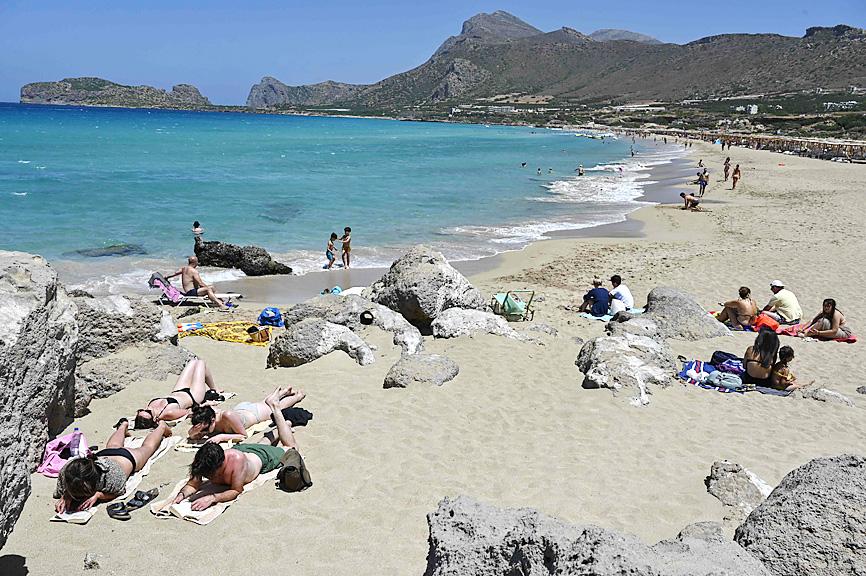An “exceptional” marine heat wave is gripping the western Mediterranean, with surface temperatures up to 5°C hotter than average, experts said.
Although the record-breaking heat wave that baked northern Europe and Britain this month has subsided, the experts said the persistently above-normal Mediterranean temperatures posed a threat to the entire marine ecosystem.
“This huge marine heat wave began in May in the Ligurian sea” between Corsica and Italy, said Karina von Schuckmann, an oceanographer at the non-profit research group Mercator Ocean International.

Photo: AFP
It then spread to the Gulf of Taranto in the Ionian Sea, she said. By July, the heat wave had engulfed the Balearic Islands, Sardinia and the Tyrrhenian Sea.
“The surface temperature anomaly map shows higher than normal values, in the order of +4 to +5C from the east of the Balearic Islands to the east of Corsica,” Mercator said in a statement.
While humans might find the warmer water temperatures pleasant in the tourist hotspots of the western Mediterranean, the group warned that “ocean warming impacts the entire ecosystem.”
“It is important to be aware of the possible consequences for local fauna and flora, as well as the occurrence of extreme weather events that could result in natural disasters,” it said.
Von Schuckmann said that unusually warm temperatures could cause irreversible migration for some species and “mass die-offs” for others.
Knock-on effects would impact industries such as tourism and fishing, which rely on favorable water conditions, she said.
According to the UN’s climate science body, marine heat waves have doubled in frequency globally since 1980.
Although the Mediterranean only counts for one percent of Earth’s ocean surface area, it contains nearly 20 percent of all known marine species.
A study published this month in the journal Global Change Biology found that the Mediterranean had experienced five consecutive years of mass mortality events from 2015 to 2019.
France’s CNRS research center has noted that marine heat waves in 1999, 2003 and 2006 caused mass die-offs for some species.
“We can predict the main impact will be on fixed organisms such as plants or corals,” said Charles-Francois Boudouresque, a marine ecologist at Aix-Marseille University.
However, some species of fish, such as the barracuda, could become more abundant in warming northern Mediterranean waters.
Boudouresque said some species coming through the Suez Canal from the Red Sea could become problematic “within five to 10 years.”
These include herbivore jellyfish and the rabbit fish, which Boudouresque described as “extremely greedy.”
Already abundant in the eastern Mediterranean, its appearance in western waters would threaten the algae forests that serve as nurseries for myriad varieties of fish. Jellyfish can also sting swimmers with enough severity to require hospital treatment.
As there is little governments can do once a marine heat wave takes hold, Von Schuckmann said the best course of action is to reduce greenhouse gas emissions that contribute to warming.
“Even if we stopped emitting today, the oceans, which contain 90 percent of Earth’s heat, will continue to warm,” she said.
“Since at least 2003 [marine heat waves] have become more common, and in future they will last longer, cover more sea, and be more intense and severe,” Von Schuckmann said.

Republican US lawmakers on Friday criticized US President Joe Biden’s administration after sanctioned Chinese telecoms equipment giant Huawei unveiled a laptop this week powered by an Intel artificial intelligence (AI) chip. The US placed Huawei on a trade restriction list in 2019 for contravening Iran sanctions, part of a broader effort to hobble Beijing’s technological advances. Placement on the list means the company’s suppliers have to seek a special, difficult-to-obtain license before shipping to it. One such license, issued by then-US president Donald Trump’s administration, has allowed Intel to ship central processors to Huawei for use in laptops since 2020. China hardliners

Conjoined twins Lori and George Schappell, who pursued separate careers, interests and relationships during lives that defied medical expectations, died this month in Pennsylvania, funeral home officials said. They were 62. The twins, listed by Guinness World Records as the oldest living conjoined twins, died on April 7 at the Hospital of the University of Pennsylvania, obituaries posted by Leibensperger Funeral Homes of Hamburg said. The cause of death was not detailed. “When we were born, the doctors didn’t think we’d make 30, but we proved them wrong,” Lori said in an interview when they turned 50, the Philadelphia Inquirer reported. The

RAMPAGE: A Palestinian man was left dead after dozens of Israeli settlers searching for a missing 14-year-old boy stormed a village in the Israeli-occupied West Bank US President Joe Biden on Friday said he expected Iran to attack Israel “sooner, rather than later” and warned Tehran not to proceed. Asked by reporters about his message to Iran, Biden simply said: “Don’t,” underscoring Washington’s commitment to defend Israel. “We are devoted to the defense of Israel. We will support Israel. We will help defend Israel and Iran will not succeed,” he said. Biden said he would not divulge secure information, but said his expectation was that an attack could come “sooner, rather than later.” Israel braced on Friday for an attack by Iran or its proxies as warnings grew of

IN PURSUIT: Israel’s defense minister said the revenge attacks by Israeli settlers would make it difficult for security forces to find those responsible for the 14-year-old’s death Israeli Prime Minister Benjamin Netanyahu on Saturday condemned the “heinous murder” of an Israeli teenager in the occupied West Bank as attacks on Palestinian villages intensified following news of his death. After Benjamin Achimeir, 14, was reported missing near Ramallah on Friday, hundreds of Jewish settlers backed by Israeli forces raided nearby Palestinian villages, torching vehicles and homes, leaving at least one villager dead and dozens wounded. The attacks escalated in several villages on Saturday after Achimeir’s body was found near the Malachi Hashalom outpost. Agence France-Presse correspondents saw smoke rising from burned houses and fields. Mayor Amin Abu Alyah, of the